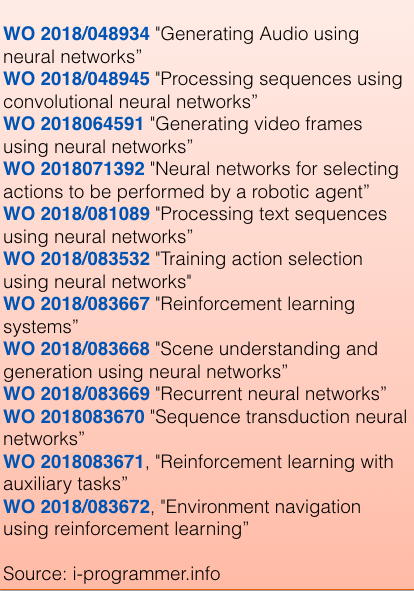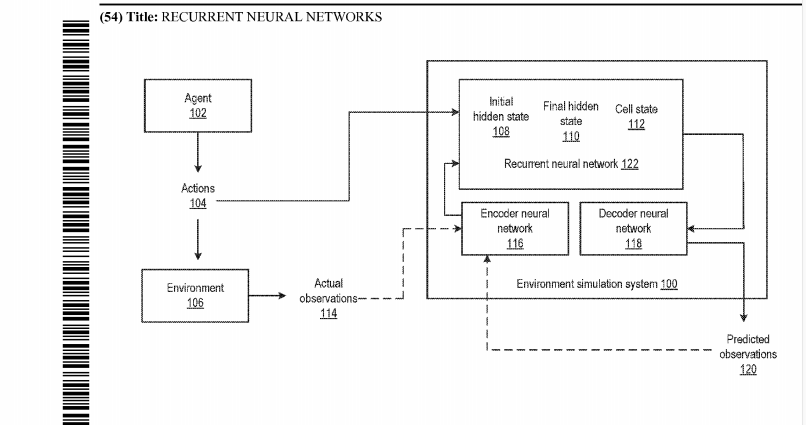 aNewDomain — So recently I noticed that the folks at Google DeepMind have been filing a bunch of patent applications for well-known AI techniques, all or nearly all of which certainly are not their original inventions.
aNewDomain — So recently I noticed that the folks at Google DeepMind have been filing a bunch of patent applications for well-known AI techniques, all or nearly all of which certainly are not their original inventions.
See for yourself. The dozen patent applications I’m referring are the first AI applications from DeepMind to be made public since Google bought it for $625M back in 2014 . The applications, which were all filed between September and December 2016, are public now because 18 months have passed since their filing.
And as IPkitten pointed out in its first analysis of the matter last month, they represent a filing rate of about a patent a week.
Now, the 12 patent applications in question are still just applications; the US Patent and Trademark Office has yet to grant any of them. My guess is it won’t, as these particular applications are so broad and unoriginal in nature and concept that they are just utterly ridiculous.
 But I’m not laughing. The USPTO could end up approving weakened versions of them.
But I’m not laughing. The USPTO could end up approving weakened versions of them.
That would be absurd, too.
It would also be downright dangerous.
To point, check out this application, titled “Recurrent Neural Networks.” Its abstract reads, in part:
… Methods, systems, and apparatus, including computer programs encoded on a computer storage medium, for environment simulation.
In one aspect, a system comprises a recurrent neural network configured to, at each of a plurality of time steps, receive a preceding action for a preceding time step, update a preceding initial hidden state of the recurrent neural network from the preceding time step using the preceding action, update a preceding cell state of the recurrent neural network from the preceding time step using at least the initial hidden state for the time step, and determine a final hidden state for the time step using the cell state for the time step.
The system further comprises a decoder neural network configured to receive the final hidden state for the time step and process the final hidden state to generate a predicted observation characterizing a predicted state of the environment at the time step ..”
Are they nuts?
Many of us were teaching and implementing this stuff well before the Web, let alone Google existed.
Google didn’t invent this stuff.
Equally ridiculous and for the same reasons is this application, titled Neural Networks for Selecting Actions to be Performed by a Robotic Agent. And so it goes with all the other patent applications in the Sept-Dec 2016 list (see sidebar, above).
Google Deep Mind is an awesome group of AI researchers and developers; I know two of the founders personally, one of them pretty well as he worked for me for a couple years around 1999-2000, and I also know a bunch of their other research staff from our interactions in the AGI community. Deep Mind has certainly has had its share of genuine AI innovations.
For instance, if it’d filed for a patent on Neural Turing Machines (which they may well have, since December 2016) it would be less insane.
I mean, you could argue there about the relation to various prior art, at least there was a genuine new invention involved.
The arguments against software patents, in general, are well known and I find them pretty compelling overall — the classic essay Why Patents are Bad for Software by Simon Garfinkel, Mitch Kapor and Richard Stallman laid out the argument fairly well. (For Stallman’s updated comments on the matter, see this article.)
Ed: Scroll to the end of the article for links to all 12 Google Deepmind patent applications in question.
And even those who argue in favor of software patents in the abstract have got to admit that the software patent system is typically used to the advantage of big companies as opposed to small ones. As Paul Heckel, in a 1992 article devoted to Debunking the Software Patent Myth, once wrote:
“The data shows that it is commonplace for large companies to pirate the technology of small entities. No case was cited where a large company licensed a small entity’s technology without first being sued, suggesting that the existing laws do not motivate large companies to resolve patent disputes with small companies quickly.”
Here we encounter Heckel’s eponymous Principle of Dealing with Big Companies: There is no such thing as a free lunch; unless you’re the lunch.
Open is open
Tesla opened up a number of its patents a few years ago.
Its motives for doing so may have been complexly business-driven, but hey, open is open.
Now, if Deep Mind patents well-known AI algorithms and then makes the patents open and the (basically spuriously) patented technology free for all to use, it will arguably be doing a service to the world and the AI community, by blocking other less beneficent big companies from patenting these things and trying to enforce the patents.
>On the other hand, obtaining even watered down versions of such patents and retaining them is just plain bad for innovation. It’s bad for AI. And it’s bad for humanity.
>Software patents are generally not all THAT impactful on the industry, occasional horror stories aside. However, the holding of patents for well known technologies is part of the megacorporation’s strategy for achieving domination. Such patents form tools that big companies can use in market battles against other big companies, and against small companies threatening their domination.
Google has never been a patent troll and their goal in filing these bogus patent applications may well be purely defensive — to protect themselves against Facebook or IBM or whomever doing the same first. It still does stink, though. It is a symbol and reminder and example of why AI technology — the most important thing happening on the planet now — should not be trusted to megacorporations.
Big companies claiming ownership rights over well-known techniques, and succeeding a certain percentage of the time, and then judiciously exerting this bogus “ownership” to advance their economic advantage — this is not the kind of dynamic we want, if our goal is beneficial AGI to uplift all sentient beings.
This is a reminder and example of why we need a mostly decentralized and open AI ecosystem, such as we’re building toward with SingularityNET. It’s also why we’re forming the Decentralized AI Alliance, with the goal of bringing together decentralization oriented AI projects.
AI innovation and application will occur most naturally and beneficially in a self-organizing, decentralized, entrepreneurial way — but there is a looming risk that the development of AI gets channeled toward narrower aims by phenomena like what we’re seeing just now from Google Deep Mind, big companies using their resources to claim ownership of ideas they did not invent.
When founded, Deep Mind made a lot of noise about its AI ethics board … with comments by folks like Jaan Tallinn and Nick Bostrom, regarding the importance of this ethics board for guiding the work of Deep Mind in the case they make serious progress toward human level Artificial General Intelligence.
But what we see lately are more immediate and practical instances of confusing AI ethics at Deep Mind, from their recent questionable preferential access to public medical data, to this rash of bogus patent applications.
For sure, none of these recent ethical oddities are as serious as a rogue AGI taking over the planet and self-modifying and self-replicating so as to turn the universe into paper clips.
But it may well be that the first human-level AIs and superhuman AIs on the planet emerge in part from a combination of earlier-stage practical AI systems created by various companies addressing various markets.
If this is the case, then having current practical AI efforts obey practical everyday ethics, and develop in a democratic and participatory rather than centralized and megacorporation-share-price-driven way, may have implications for longer-term AGI ethics as well as for the near-term health of society and the AI ecosystem.
For aNewDomain commentary, I’m Ben Goertzel.
As first reported by IPKitten in June 2018, Deepmind’s published AI patent applications include:
- WO 2018/048934, “Generating Audio using neural networks”, Priority date: 6 Sep 2016
- WO 2018/048945, “Processing sequences using convolutional neural networks”, Priority date: 6 Sep 2016
- WO 2018064591, “Generating video frames using neural networks”, Priority date: 6 Sep 2016
- WO 2018071392, “Neural networks for selecting actions to be performed by a robotic agent”, Priority date: 10 Oct 2016
- WO 2018/081089, “Processing text sequences using neural networks”, Priority date: 26 Oct 2016
- WO 2018/083532, “Training action selection using neural networks”, Priority date: 3 Nov 2016
- WO 2018/083667, “Reinforcement learning systems”, Priority date: 4 Nov 2016
- WO 2018/083668, “Scene understanding and generation using neural networks”, Priority date: 4 Nov 2016
- WO 2018/083669, “Recurrent neural networks”, Priority date: 4 Nov 2016
- WO 2018083670, “Sequence transduction neural networks”, Priority date: 4 Nov 2016
- WO 2018083671, “Reinforcement learning with auxiliary tasks”, Priority date: 4 Nov 2016
- WO 2018/083672, “Environment navigation using reinforcement learning”, Priority date: 4 Nov 2016













